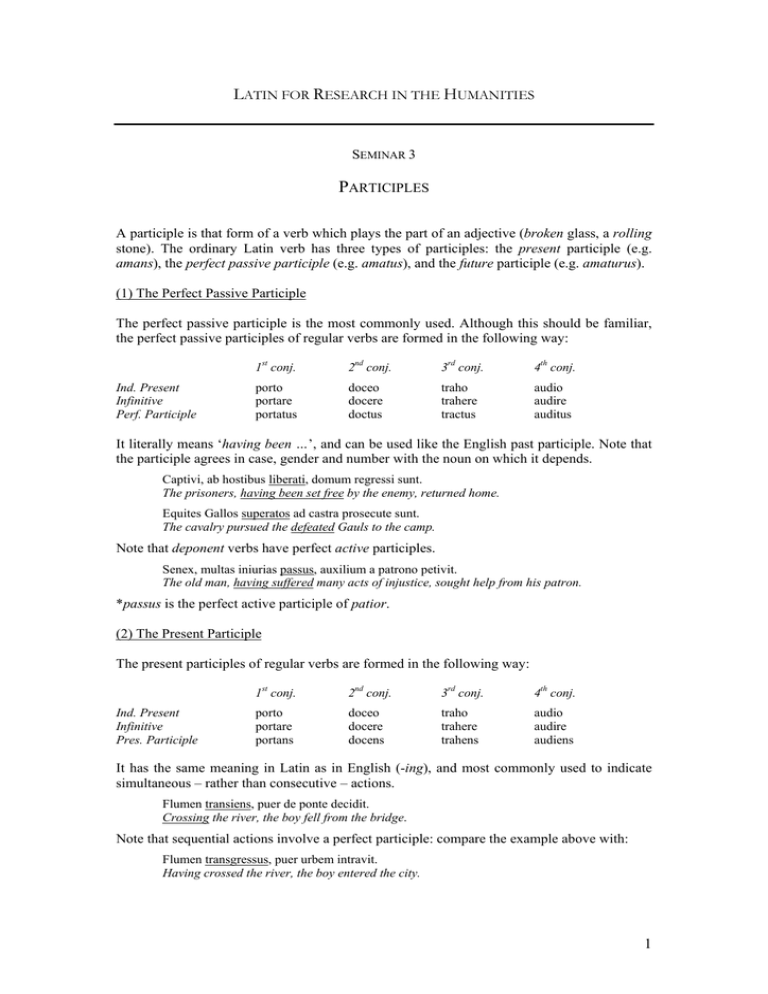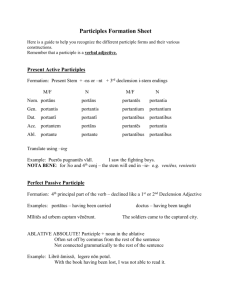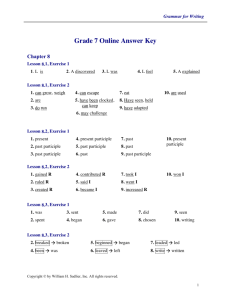L R H
advertisement

LATIN FOR RESEARCH IN THE HUMANITIES SEMINAR 3 PARTICIPLES A participle is that form of a verb which plays the part of an adjective (broken glass, a rolling stone). The ordinary Latin verb has three types of participles: the present participle (e.g. amans), the perfect passive participle (e.g. amatus), and the future participle (e.g. amaturus). (1) The Perfect Passive Participle The perfect passive participle is the most commonly used. Although this should be familiar, the perfect passive participles of regular verbs are formed in the following way: Ind. Present Infinitive Perf. Participle 1st conj. 2nd conj. 3rd conj. 4th conj. porto portare portatus doceo docere doctus traho trahere tractus audio audire auditus It literally means ‘having been …’, and can be used like the English past participle. Note that the participle agrees in case, gender and number with the noun on which it depends. Captivi, ab hostibus liberati, domum regressi sunt. The prisoners, having been set free by the enemy, returned home. Equites Gallos superatos ad castra prosecute sunt. The cavalry pursued the defeated Gauls to the camp. Note that deponent verbs have perfect active participles. Senex, multas iniurias passus, auxilium a patrono petivit. The old man, having suffered many acts of injustice, sought help from his patron. *passus is the perfect active participle of patior. (2) The Present Participle The present participles of regular verbs are formed in the following way: Ind. Present Infinitive Pres. Participle 1st conj. 2nd conj. 3rd conj. 4th conj. porto portare portans doceo docere docens traho trahere trahens audio audire audiens It has the same meaning in Latin as in English (-ing), and most commonly used to indicate simultaneous – rather than consecutive – actions. Flumen transiens, puer de ponte decidit. Crossing the river, the boy fell from the bridge. Note that sequential actions involve a perfect participle: compare the example above with: Flumen transgressus, puer urbem intravit. Having crossed the river, the boy entered the city. 1 (3) The Future Participle The future participle of regular verbs is formed in the following way: Ind. Present Infinitive Fut. Participle 1st conj. 2nd conj. 3rd conj. 4th conj. porto portare portaturus doceo docere docturus traho trahere tracturus audio audire auditurus The future participle has an active meaning and usually means ‘about to…’ Mercatores navem conscensuros vidi. I saw the merchants about to board the ship. It is commonly used as a complement to the verb esse, to express ‘likely to’ or ‘intending to’. Facite quod vobis libet: daturus non sum amplius. Do whatever you like: I don’t intend to give any more. Exercises (1) Hostes, a Romanis superati, fugerunt. (2) Cicero epistolam a filio suo missam legit. (3) Nauta in navem conscendens in mare incidit. (4) Magister mihi scribenti errorem monstravit. (5) Nonne hostes castra oppugnaturi sunt? (6) Senex moriturus filios ad se vocavit. (4) The Ablative Absolute Sometimes, a participle is used in conjunction with a noun to form a phrase which is grammatically detached from the main sentence to indicate a sense of time. Both the noun and the participle are in the ablative case. These ablative absolutes are very common in Latin. Pecunia accepta, Sibylla libros tradidit. The money having been accepted, the Sibyl handed over the books. Duce loquente, nuntius accurrit. While the leader was speaking (lit. With the leader speaking), a messenger came dashing up. Exercises (1) Poeta recitante, fur pecuniam spectatoribus auferebat. (2) Ponte deleto, nemo flumen transpire poterat. (3) Romani, urbe capta, valde gaudebant. (4) Domina egressa, servi garrire coeperunt. 2





